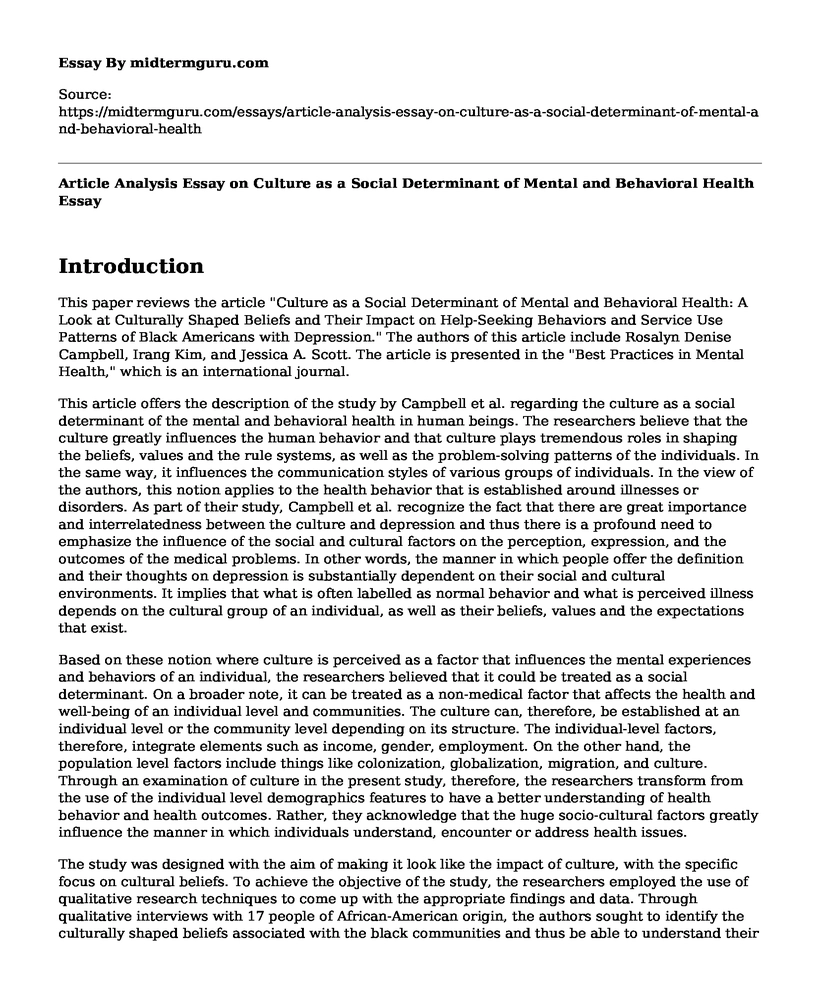Introduction
This paper reviews the article "Culture as a Social Determinant of Mental and Behavioral Health: A Look at Culturally Shaped Beliefs and Their Impact on Help-Seeking Behaviors and Service Use Patterns of Black Americans with Depression." The authors of this article include Rosalyn Denise Campbell, Irang Kim, and Jessica A. Scott. The article is presented in the "Best Practices in Mental Health," which is an international journal.
This article offers the description of the study by Campbell et al. regarding the culture as a social determinant of the mental and behavioral health in human beings. The researchers believe that the culture greatly influences the human behavior and that culture plays tremendous roles in shaping the beliefs, values and the rule systems, as well as the problem-solving patterns of the individuals. In the same way, it influences the communication styles of various groups of individuals. In the view of the authors, this notion applies to the health behavior that is established around illnesses or disorders. As part of their study, Campbell et al. recognize the fact that there are great importance and interrelatedness between the culture and depression and thus there is a profound need to emphasize the influence of the social and cultural factors on the perception, expression, and the outcomes of the medical problems. In other words, the manner in which people offer the definition and their thoughts on depression is substantially dependent on their social and cultural environments. It implies that what is often labelled as normal behavior and what is perceived illness depends on the cultural group of an individual, as well as their beliefs, values and the expectations that exist.
Based on these notion where culture is perceived as a factor that influences the mental experiences and behaviors of an individual, the researchers believed that it could be treated as a social determinant. On a broader note, it can be treated as a non-medical factor that affects the health and well-being of an individual level and communities. The culture can, therefore, be established at an individual level or the community level depending on its structure. The individual-level factors, therefore, integrate elements such as income, gender, employment. On the other hand, the population level factors include things like colonization, globalization, migration, and culture. Through an examination of culture in the present study, therefore, the researchers transform from the use of the individual level demographics features to have a better understanding of health behavior and health outcomes. Rather, they acknowledge that the huge socio-cultural factors greatly influence the manner in which individuals understand, encounter or address health issues.
The study was designed with the aim of making it look like the impact of culture, with the specific focus on cultural beliefs. To achieve the objective of the study, the researchers employed the use of qualitative research techniques to come up with the appropriate findings and data. Through qualitative interviews with 17 people of African-American origin, the authors sought to identify the culturally shaped beliefs associated with the black communities and thus be able to understand their influence or impacts on the participants' views on depression and its treatment. The major themes revolved around three areas that included: (a) black people don't get depressed, (b) I don't trust the doctors and the treatment, and (c) you don't need a doctor.
The researchers also discussed the impacts of these culturally shaped beliefs. Their greatest impacts were related to the manner in which the respondents thought about help for their depression as well as the people they spoke to about their distress. The researchers concluded that the current understanding of the mental disorders particularly the depression revolves around the westernized concepts and constructs. The cross-cultural diversity provides a greater emphasis on the culturally-appropriate symptoms and questions, with the assumptions that the concepts and constructs are suitable to a given culture. Different depression patterns among the black communities are perceived differently regarding the cause, understanding and the treatment options.
In reality, this study offers a greater insight regarding the manner in which the socio-cultural factors can influence the perception of the mental disorders. Mental illnesses or depression affect a large proportion of the Americans, with many of the affected findings it difficult to open themselves about the situation. The west, for instance, has increasingly pathologized depression and attributed it to the biomedical factors. Majority of people further tend to distance themselves from the distress as a function to help them cope with the situation. However, the articles suggest various ways and treatment options that can be utilized for individuals within the culturally-sensitive communities.
Conclusion
The findings and conclusions in the article are vital in shaping my decisions regarding future career. As an expert, I will be able to use the suggested treatment options and solutions to people with depression as well as other mental disorders.
References
Campbell, R. D., & Long, L. A. (2014). Culture as a social determinant of mental and behavioral health: a look at culturally shaped beliefs and their impact on help-seeking behaviors and service use patterns of Black Americans with depression. , 10, 2, 10(2), 48-62.
Cite this page
Article Analysis Essay on Culture as a Social Determinant of Mental and Behavioral Health. (2022, Oct 14). Retrieved from https://midtermguru.com/essays/article-analysis-essay-on-culture-as-a-social-determinant-of-mental-and-behavioral-health
If you are the original author of this essay and no longer wish to have it published on the midtermguru.com website, please click below to request its removal:
- Mental Health and Risk of Offending
- Fiedlers Contingency Model - Management Essay Sample
- Paper Example on Multicultural Teaming
- Paper Example on Family Demography, Dynamics, and Concepts
- Martin Luther King Jr. & Aung San Suu Kyi as Religious Social-Reformists - Essay Sample
- Annotated Bibliography on Video Games Contribute to The Causes of Violence In Modern Society
- Fear/Afraid - Essay Sample







